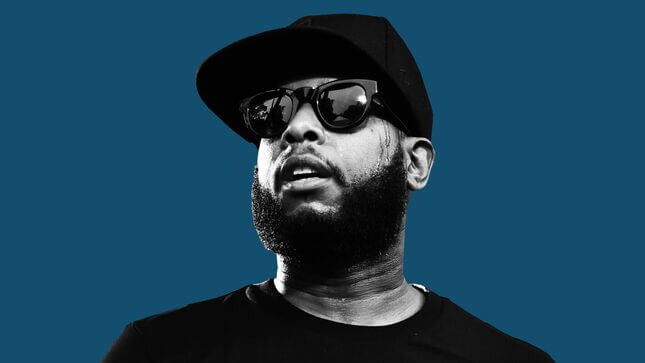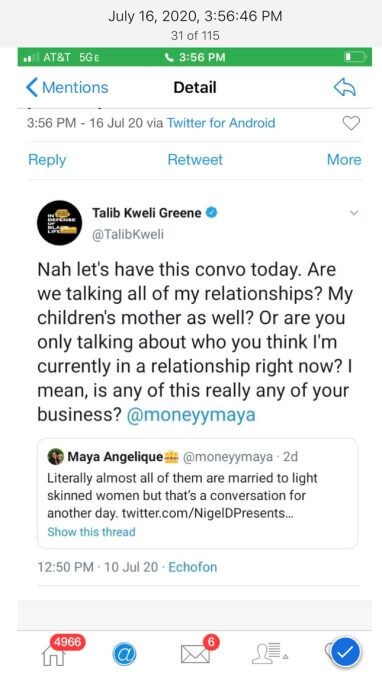Talib Kweli's Harassment Campaign Shows How Unprotected Black Women Are Online and Off
Latest
Graphic: Jezebel (Photos: Bryan Bedder/Stringer/Getty Images)
In late July, rapper Talib Kweli posted a lengthy message to his Instagram account, announcing that after 11 years, he was finally leaving Twitter. “I have officially left @twitter for the greener pastures of @patreon which is membership fee based,” Kweli wrote. “Now most of my exchanges will always be with real fans who invest in me.”
But Kweli didn’t leave Twitter voluntarily. On July 23, Kweli was suspended for “repeated violations of Twitter rules,” according to a spokesperson for the app, after he spent over two weeks in the mentions of black women who characterized his behavior as harassment. His primary target: A 24-year-old student and activist named Maya Moody, who became Kweli’s obsession after a discussion about colorism in hip-hop went left.
The suspension came nearly two weeks after Kweli began incessantly tweeting at Moody, sometimes for more than 12 hours straight in a single day. During that time, several Black women participated in a campaign to report Kweli for targeted harassment and get him suspended, to no avail.
It’s unclear what, precisely, changed Twitter Support’s mind after weeks of inaction. In a statement to Jezebel, a Twitter spokesperson claimed his account was suspended for violating its rules around harassment, among other things:
“[Talib Kweli’s] account has been permanently suspended after repeated violations of the Twitter rules. Twitter’s purpose is to serve the public conversation. Violence, harassment and other similar types of behavior discourage people from expressing themselves, and ultimately diminish the value of global public conversation. Our rules are to ensure all people can participate in the public conversation freely and safely.”
Moody is unsurprised by Twitter’s initial inaction, which fits into a pattern of the company ignoring rampant abuse against Black women on the platform. “Twitter has a history of defending those who speak out against oppression—specifically Black people—but staying silent when white supremacists and alt-right people are saying unbelievable things online and still allowing them to have platforms, still allowing them to post crazy things,” Moody explained. “But those that have spoken against [bigots] have been suspended for way less than targeting someone and harassing them constantly for over two weeks straight.”
Twitter is familiar with this critique from Black women. In 2019, Rachelle Hampton wrote a piece for Slate about Black feminists who encountered far-right trolls on Twitter in the early and mid-2010s; this was before Gamergate and before the calamity of the 2016 presidential election. Whether it was white men masquerading as Black people or other racist and sexist harassment campaigns, Black women have often been the early targets of coordinated harassment and doxxing before it spreads to other people of color and white people. Yet they’ve been largely ignored. As Hampton wrote in Slate, “some media outlets diminished the danger of ‘trolls’ by characterizing their flirtation with white nationalism as tongue-in-cheek—until those trolls took their rhetoric offline and onto the streets of Charlottesville, Virginia.”
While the Kweli debacle isn’t a matter of racist right-wingers versus Black women, the harassment campaign Moody has endured illuminates a larger concern Black women have long held about normalized harassment on Twitter. Whether from miscellaneous trolls or verified Twitter users like Kweli, Moody’s experience is not just an isolated incident, but rather a microcosm of the harm Black women experience online daily—whether or not anyone listens.
It started in early July, when a video of rappers 50 Cent and Lil’ Wayne talking about dating “exotic”—i.e. non-Black—women made the rounds, prompting a Twitter user to ask which rappers, aside from Snoop Dogg, are married to Black women. Another user replied with a list of names: Jay-Z, 2 Chainz, Gucci Mane, Chance the Rapper, Ludacris, Kendrick Lamar, Big Boi, Killer Mike, and more. Talib Kweli was also included in the list.
-

-

-

-

-

-

-

-

-

-

-

-

-

-

-

-

-

-

-

-

-

-

-

-

-

-

-

-

-

-

-

-

-

-

-

-

-

-

-

-









































